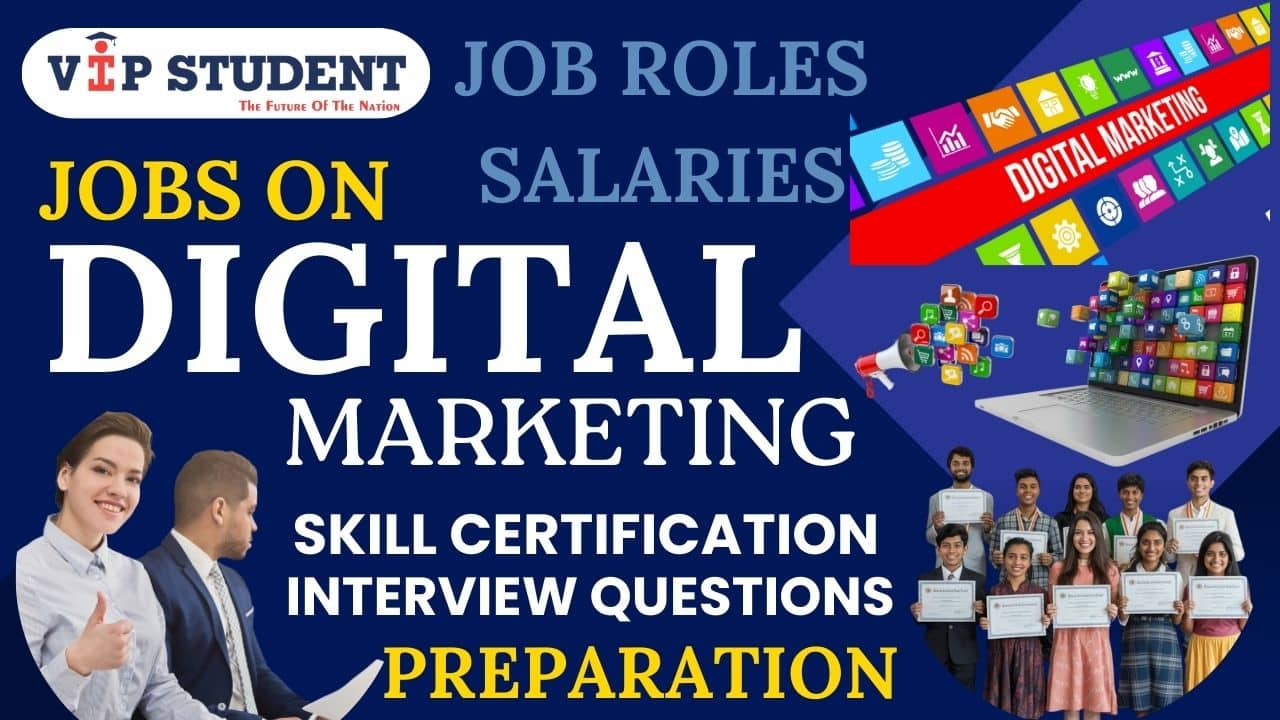LET’S KNOW ABOUT DIGITAL MARKETING JOB ROLES, REQUIRED SKILLS, PRCTICE JOB INTERVIEW QUESTIONS AND GET CERTIFIED ON DIGITAL MARKETING SKILLS
DIGITAL MARKETING JOB ROLES AND INTERVIEW QUSTIONS: In today’s digital-first world, businesses rely heavily on online platforms to reach their target audiences. As a result, digital marketing has become one of the most in-demand career fields. What sets digital marketing apart is that it’s largely skills-based — meaning your ability to master certain tools and techniques is more important than just academic qualifications. Whether you’re just starting your career or planning a switch, understanding the core skills and the jobs they lead to is essential.
Whether you’re a job seeker or a student planning your career let’s know about Digital Marketing job roles, required skills, practice on job interview questions and get certified on your Digital Marketing skills.
JOBS ON DIGITAL MARKETING AND CAREER OPPORTUNITES
🔹 1. Digital Marketing Executive
-
Role: Implements online marketing strategies, manages social media, email campaigns, and helps drive website traffic.
-
Suitable for: Freshers and entry-level professionals.
🔹 2. SEO Specialist (Search Engine Optimization)
-
Role: Optimizes website content to rank higher in search engine results, increases organic traffic.
-
Skills Needed: Keyword research, on-page SEO, backlinking, analytics.
🔹 3. SEM/PPC Specialist (Search Engine Marketing)
-
Role: Manages paid advertising campaigns on platforms like Google Ads and Bing Ads.
-
Skills Needed: Google Ads, budgeting, A/B testing, keyword bidding.
🔹 4. Social Media Manager
-
Role: Plans and executes campaigns on Facebook, Instagram, LinkedIn, and Twitter to increase brand awareness and engagement.
-
Skills Needed: Content creation, community management, analytics.
🔹 5. Content Marketing Executive
-
Role: Develops blog posts, articles, videos, and other content to engage users and improve SEO.
-
Skills Needed: Writing, editing, storytelling, content strategy.
🔹 6. Email Marketing Specialist
-
Role: Creates and manages email campaigns to nurture leads and retain customers.
-
Skills Needed: Email platforms (e.g., Mailchimp), segmentation, A/B testing.
🔹 7. Affiliate Marketing Manager
-
Role: Manages relationships with affiliates, tracks conversions, and expands affiliate partnerships.
-
Skills Needed: Relationship-building, performance tracking, negotiation.
🔹 8. E-commerce Marketing Specialist
-
Role: Promotes products on platforms like Amazon, Flipkart, Shopify; optimizes product listings and handles digital sales strategy.
-
Skills Needed: Marketplace management, analytics, pricing strategy.
🔹 9. Influencer Marketing Coordinator
-
Role: Identifies and works with influencers to promote brand campaigns.
-
Skills Needed: Outreach, negotiation, content planning.
🔹 10. Web Analytics Expert
-
Role: Tracks and analyzes website data using tools like Google Analytics, helping improve performance and ROI.
-
Skills Needed: Data analysis, reporting, visualization.
🔹 11. Conversion Rate Optimization (CRO) Specialist
-
Role: Focuses on improving website elements to increase lead generation and sales.
-
Skills Needed: A/B testing, user behavior analysis, UI/UX basics.
🔹 12. Digital Marketing Manager
-
Role: Leads the digital marketing team and strategy; oversees all campaigns.
-
Experience Level: Requires 3–5 years of prior experience in digital marketing roles.
🔹 13. Marketing Automation Specialist
-
Role: Uses tools to automate repetitive marketing tasks (emails, lead scoring, workflows).
-
Tools: HubSpot, Marketo, ActiveCampaign.
🔹 14. Video Marketing Specialist
-
Role: Creates and markets video content for platforms like YouTube, Instagram, and TikTok.
-
Skills Needed: Video editing, script writing, optimization.
🔹 15. Freelance Digital Marketer
-
Role: Offers digital marketing services to clients remotely.
-
Ideal For: Those looking for flexible, project-based work.
✅ Industries Hiring Digital Marketers
-
E-commerce
-
IT/Tech companies
-
Startups
-
Media and Entertainment
-
Education/EdTech
-
Healthcare
-
Real estate
-
Travel and Hospitality
📈 Career Growth & Salaries
-
Freshers (0–1 yr): ₹15,000–₹25,000/month
-
Mid-Level (2–5 yrs): ₹30,000–₹70,000/month
-
Senior Level: ₹1 lakh+/month
🎓 Certifications That Help
-
Google Digital Marketing Certification (Free)
-
HubSpot Inbound Marketing
-
Meta (Facebook) Blueprint
-
Google Ads and Analytics Certifications
-
SEMrush & Moz SEO Certifications
✅ Digital Marketing Skills & Knowledge – Interview Questions and Answers
- Q: What is digital marketing?
A: Digital marketing involves promoting products or services through online platforms like search engines, social media, email, and websites to reach and engage target audiences effectively.
- Q: What are the key components of a digital marketing strategy?
A: Target audience research, goal setting, channel selection (SEO, PPC, social media, etc.), content planning, execution, and performance tracking using KPIs.
- Q: What is SEO and why is it important?
A: SEO (Search Engine Optimization) improves a website’s visibility on search engines, leading to more organic traffic, credibility, and long-term marketing ROI.
- Q: What’s the difference between on-page and off-page SEO?
A: On-page SEO refers to optimizing website elements like titles, keywords, and content. Off-page SEO includes backlink building, social sharing, and domain authority improvements.
- Q: What tools do you use for keyword research?
A: Google Keyword Planner, SEMrush, Ahrefs, Moz, and Ubersuggest.
- Q: What is PPC?
A: Pay-Per-Click (PPC) is a digital advertising model where advertisers pay each time their ad is clicked, commonly used on platforms like Google Ads and Facebook Ads.
- Q: How do you improve a Google Ads campaign?
A: By refining keywords, improving ad copy, using negative keywords, A/B testing, optimizing landing pages, and adjusting bids.
- Q: What are negative keywords in PPC?
A: These are keywords you exclude to prevent your ads from appearing for irrelevant or low-quality traffic.
- Q: What’s the importance of a landing page in digital marketing?
A: A landing page is crucial for converting visitors into leads or customers. It should be focused, relevant, and optimized for user experience and conversions.
- Q: What are the benefits of social media marketing?
A: It builds brand awareness, engages audiences, drives website traffic, boosts SEO, and can generate leads and sales through targeted campaigns.
- Q: Which social media platforms do you prefer for B2B marketing?
A: LinkedIn is most effective for B2B, followed by Twitter and YouTube for thought leadership and industry engagement.
- Q: How do you measure the success of a social media campaign?
A: By tracking engagement (likes, comments, shares), reach, impressions, click-through rates, and conversions using platform insights or third-party tools.
- Q: What is content marketing?
A: Content marketing involves creating and distributing valuable content (blogs, videos, infographics) to attract, inform, and retain a target audience.
- Q: How do you create an effective content strategy?
A: Understand the audience, set goals, perform keyword research, create a content calendar, publish consistently, and measure performance.
- Q: What are backlinks and why are they important?
A: Backlinks are links from other websites to yours. They signal trust and authority to search engines, helping improve SEO rankings.
- Q: What is the role of email marketing in digital strategy?
A: Email marketing helps in lead nurturing, customer retention, product promotion, and personalized engagement, with a high ROI.
- Q: What’s the difference between a newsletter and a drip campaign?
A: A newsletter is a recurring general update. A drip campaign is a series of automated emails triggered by specific user actions or behavior.
- Q: What is A/B testing in digital marketing?
A: A/B testing compares two versions of a marketing element (e.g., ad, landing page) to see which performs better based on data.
- Q: What is a call to action (CTA)?
A: A CTA prompts users to take a specific action like “Buy Now” or “Subscribe,” guiding them down the conversion funnel.
- Q: What tools do you use to analyze website performance?
A: Google Analytics, Google Search Console, Hotjar, SEMrush, and Ahrefs.
- Q: What is bounce rate?
A: Bounce rate is the percentage of visitors who leave a website without interacting with it. A high bounce rate may indicate poor user experience or irrelevant content.
- Q: How do you handle a drop in website traffic?
A: Analyze traffic sources in Google Analytics, check for algorithm updates, audit SEO performance, review technical issues, and evaluate content quality.
- Q: What is marketing automation?
A: Marketing automation uses tools to automate tasks like email campaigns, lead nurturing, and social media scheduling to increase efficiency and personalization.
- Q: What is the customer journey?
A: It’s the complete experience a customer has with a brand — from awareness, consideration, and purchase, to post-purchase engagement. - Q: What is the role of analytics in digital marketing?
A: Analytics helps track performance, understand user behavior, optimize campaigns, and make data-driven decisions for better results.
DIGITAL MARKETING INTERVIEW QUESTIONS BASED ON COTOGIRY AND JOB ROLES
🔍 SEO (Search Engine Optimization) In Digital Marketing
- Q: What’s the difference between on-page and off-page SEO?
A: On-page SEO refers to optimizing elements within your website like content, meta tags, and internal links. Off-page SEO involves external efforts like link building and social signals to improve domain authority. - Q: How do you perform keyword research?
A: I use tools like Google Keyword Planner, Ahrefs, or Ubersuggest to find relevant terms, analyze volume, competition, and search intent to choose target keywords. - Q: What SEO tools have you used?
A: Google Search Console, SEMrush, Ahrefs, Moz, and Screaming Frog for audits, tracking rankings, and backlink analysis. - Q: How would you improve the ranking of a webpage?
A: Improve content quality, target keywords, optimize meta tags, increase page speed, and build quality backlinks. - Q: What is technical SEO?
A: It includes optimizing website structure, crawlability, indexing, site speed, mobile usability, and fixing errors in XML sitemaps or robots.txt. - Q: How do you handle duplicate content?
A: I use canonical tags, 301 redirects, and ensure consistent internal linking to prevent duplication issues. - Q: What’s the difference between 301 and 302 redirects?
A: 301 is a permanent redirect and passes SEO value; 302 is temporary and doesn’t pass link equity. - Q: How do Core Web Vitals impact SEO?
A: They measure page experience like load time, interactivity, and layout shift — Google uses them as ranking signals. - Q: How do you optimize images for SEO?
A: Compress images, use descriptive file names, alt text, and lazy loading. - Q: How do you measure SEO success?
A: Through KPIs like organic traffic, keyword rankings, bounce rate, and conversions via Google Analytics and Search Console.
📝 Content Marketing In Digital Marketing
- Q: What makes content successful?
A: Relevance, value to the audience, SEO optimization, and alignment with business goals. - Q: How do you create a content strategy?
A: Define goals, identify target audience, do content audits, plan topics based on SEO research, and set publishing and promotion schedules. - Q: What’s your process for writing SEO-friendly content?
A: Keyword research → Topic structure → Writing with headings → Optimize metadata → Add internal/external links → Proofread. - Q: What tools do you use to write and manage content?
A: Google Docs, Grammarly, Surfer SEO, WordPress, Trello, and Canva. - Q: How do you repurpose content?
A: Convert blog posts into videos, infographics, social posts, or email series for broader reach. - Q: How do you measure content performance?
A: Track traffic, time on page, bounce rate, backlinks, and conversions. - Q: How do you write for different buyer personas?
A: Customize tone, format, and message based on audience demographics, pain points, and stage in the buyer’s journey. - Q: What’s pillar content?
A: Long-form content covering a broad topic, supported by shorter cluster posts linked internally for SEO. - Q: How do you ensure your content stands out?
A: Focus on unique insights, storytelling, data, visuals, and providing actionable takeaways. - Q: What’s your favorite type of content to create?
A: Blog posts and guides because they drive long-term SEO traffic and are easy to repurpose.
📱 Social Media Marketing In Digital Marketing
- Q: How do you plan a social media campaign?
A: Define objectives, select platforms, create a content calendar, design creatives, run paid ads (if needed), and analyze results. - Q: How do you measure social media success?
A: Through metrics like engagement rate, reach, clicks, conversions, and follower growth. - Q: Which platforms have you worked with most?
A: Instagram, Facebook, LinkedIn, and Twitter — each with different tone and engagement strategies. - Q: What is your approach to dealing with negative comments?
A: Stay calm, respond politely, take the issue offline if needed, and show the brand’s commitment to solving problems. - Q: How do you optimize posts for engagement?
A: Use relevant hashtags, engaging captions, CTAs, post at optimal times, and include visuals or videos. - Q: What’s your experience with paid social ads?
A: I’ve run Facebook and Instagram ads using Meta Ads Manager, focusing on split testing and optimizing for conversions. - Q: What is the difference between reach and impressions?
A: Reach is the number of unique users; impressions are total views, including multiple views by the same user. - Q: How do you work with influencers?
A: Identify the right fit based on audience and engagement, outline goals, track performance with UTM links or affiliate codes. - Q: How do you stay updated with social trends?
A: Follow industry blogs, use social listening tools, and observe competitors and platform updates. - Q: What’s a campaign you’re proud of?
A: [Provide your own example of a successful campaign and its results.]
💰 PPC & Paid Advertising
- Q: How do you set up a Google Ads campaign?
A: Choose campaign type → Set targeting → Add keywords → Write ad copy → Set bids and budget → Launch and monitor. - Q: What is Quality Score in Google Ads?
A: A score based on ad relevance, landing page experience, and CTR. Higher scores reduce CPC. - Q: How do you lower CPC?
A: Improve Quality Score, use long-tail keywords, and optimize landing pages. - Q: What’s A/B testing in PPC?
A: Running two ad versions to test headlines, copy, or images for performance comparison. - Q: How do you track PPC conversions?
A: Use conversion tracking in Google Ads and integrate with Google Analytics or CRM tools. - Q: What is remarketing?
A: Showing ads to users who previously visited your site to encourage them to return and convert. - Q: What is your preferred campaign type in Google Ads?
A: Depends on goals — Search for intent, Display for awareness, Video for engagement. - Q: What metrics do you monitor daily in PPC?
A: CTR, CPC, conversions, conversion rate, and impression share. - Q: How do you determine PPC budget?
A: Based on target CPA, competition, and forecasted ROI. - Q: How do you write effective ad copy?
A: Highlight value proposition, include keywords, use action words, and add urgency or offers.
📧 Email Marketing In Digital Marketing
- Q: What email platforms have you used?
A: Mailchimp, ActiveCampaign, Klaviyo, and Constant Contact. - Q: How do you segment an email list?
A: Based on user behavior, purchase history, demographics, and engagement levels. - Q: What makes a good email subject line?
A: It’s short, relevant, and creates curiosity or urgency without being spammy. - Q: How do you increase email open rates?
A: Use engaging subject lines, personalize emails, send at the right time, and clean your list regularly. - Q: What metrics do you track for email performance?
A: Open rate, click-through rate (CTR), bounce rate, unsubscribe rate, and conversions.
📊 Analytics & Reporting in Digital Marketing
- Q: What are your go-to analytics tools?
A: Google Analytics, Google Data Studio, Hotjar, and Meta Insights. - Q: What KPIs do you track for digital marketing?
A: Traffic, bounce rate, conversion rate, CTR, ROI, and cost per acquisition. - Q: How do you report campaign performance to a client?
A: Use dashboards, compare against KPIs, visualize trends, and provide actionable insights. - Q: How do you track user behavior on a website?
A: Google Analytics and tools like Hotjar (heatmaps, session recordings). - Q: Can you describe a time you used data to make a marketing decision?
A: [Insert your personal example — e.g., optimizing a landing page after analyzing high bounce rates.]
🧲 Affiliate Marketing in Digital Marketing
- Q: What is affiliate marketing?
A: It’s a performance-based model where affiliates earn a commission for promoting another company’s products or services. - Q: How do you recruit quality affiliates?
A: Through affiliate networks, outreach campaigns, and building relationships with niche influencers or bloggers. - Q: What tools/platforms do you use for affiliate programs?
A: ShareASale, CJ Affiliate, Rakuten, Impact, and in-house tracking tools like Refersion. - Q: How do you prevent fraud in affiliate marketing?
A: Monitor traffic quality, restrict incentivized traffic, use fraud detection tools, and manually review suspicious activity. - Q: What are key KPIs for affiliate programs?
A: Revenue, number of active affiliates, average order value (AOV), and cost per acquisition (CPA).
👩🎤 Influencer Marketing in Digital Marketing
- Q: How do you identify the right influencers for a brand?
A: Look at engagement rate, niche alignment, audience demographics, and past collaboration results. - Q: What’s the difference between micro and macro influencers?
A: Micro influencers (10K–100K followers) usually have higher engagement; macro influencers (>100K) offer broader reach. - Q: How do you measure influencer campaign success?
A: Track metrics like engagement, reach, referral traffic, conversions, and use promo codes or UTM links. - Q: What should be included in an influencer brief?
A: Campaign goal, brand guidelines, deliverables, deadlines, and compensation structure. - Q: What are common challenges in influencer marketing?
A: Inauthentic partnerships, fake followers, poor alignment with brand values, and unclear ROI.
⚙️ Marketing Automation in Digital Marketing
- Q: What is marketing automation?
A: Using software to automate marketing tasks like emails, social posts, and campaign tracking to improve efficiency. - Q: Which platforms have you used?
A: HubSpot, ActiveCampaign, Marketo, Mailchimp, and Pardot. - Q: What are key benefits of automation?
A: Increased efficiency, lead nurturing, better personalization, and higher conversion rates. - Q: How do you set up an email drip campaign?
A: Define audience and triggers → Design email sequence → Set sending intervals → Monitor and optimize. - Q: How do you segment leads in automation platforms?
A: Based on behavior, demographics, lead score, or funnel stage.
🛍️ E-commerce Marketing in Digital Marketing
Q: How does digital marketing support e-commerce?
A: Through SEO, paid ads, email campaigns, social proof, and optimized product pages for conversions.
Q: What are the best platforms for e-commerce ads?
A: Google Shopping, Meta Ads, TikTok, Pinterest, and Amazon Ads.
Q: How do you reduce cart abandonment?
A: Use retargeting ads, exit-intent popups, abandoned cart emails, and streamline the checkout process.
Q: What tools help with e-commerce tracking?
A: Google Analytics (Enhanced Ecommerce), Shopify analytics, and heatmapping tools like Hotjar.
Q: What is ROAS?
A: Return on Ad Spend – calculated as revenue generated from ads divided by the ad cost.
📊 Web Analytics in Digital Marketing
- Q: What’s your experience with Google Analytics 4 (GA4)?
A: GA4 uses event-based tracking, allows better cross-device analysis, and gives deeper insights into user journeys. - Q: What is bounce rate and why does it matter?
A: It shows the percentage of visitors who leave without interacting. A high bounce rate may signal poor user experience. - Q: What is a UTM parameter?
A: A UTM tag is added to a URL to track the effectiveness of campaigns in analytics tools. - Q: How do you measure user engagement?
A: Time on page, session duration, pages per session, scroll depth, and click events. - Q: What’s your method for tracking conversions?
A: Set up goals in GA, use GTM for event tracking, and integrate with CRM or e-commerce platforms.
🔁 Conversion Rate Optimization (CRO) in Digital Marketing
- Q: What is CRO?
A: CRO is the process of increasing the percentage of website visitors who complete a desired action. - Q: What tools do you use for CRO?
A: Google Optimize, Optimizely, Hotjar, VWO, and Crazy Egg. - Q: How do you identify what needs to be optimized?
A: Analyze heatmaps, user behavior, bounce rates, and test landing pages using A/B or multivariate testing. - Q: What elements often affect conversion rates?
A: CTA placement, load time, trust signals (reviews, badges), form length, and mobile responsiveness. - Q: Share an example where you improved conversions.
A: [Candidate can insert their example—e.g., reducing form fields increased sign-ups by 20%.]
🎥 Video Marketing in Digital Marketing
- Q: Why is video marketing important?
A: Video increases engagement, boosts conversions, improves SEO, and performs well on social media. - Q: What types of videos are best for marketing?
A: Explainer videos, testimonials, product demos, how-to guides, and behind-the-scenes content. - Q: How do you optimize videos for SEO?
A: Use descriptive titles, video transcripts, keyword-rich descriptions, and tags. - Q: Which platforms work best for video marketing?
A: YouTube, Instagram Reels, TikTok, LinkedIn, and Facebook. - Q: What tools do you use to create/edit videos?
A: Adobe Premiere Pro, Canva, InVideo, CapCut, and iMovie.
🧠 Digital Strategy / Marketing Manager Roles in Digital Marketing
- Q: How do you plan a digital marketing strategy?
A: Conduct audience and competitor research, define SMART goals, allocate budget, choose channels, and create a content + promotion plan. - Q: How do you prioritize marketing channels?
A: Based on audience behavior, past campaign data, industry trends, and ROI projections. - Q: What’s your process for managing a team?
A: Set clear KPIs, assign tasks by strengths, hold weekly check-ins, and use project management tools. - Q: How do you manage a marketing budget?
A: Allocate funds based on campaign goals, monitor spend weekly, and adjust based on performance metrics. - Q: How do you report to executives or clients?
A: Create monthly reports with KPIs, performance highlights, key insights, and recommended next steps.
GENERAL JOB INTERVIEW QUESTIONS AND SAMPLE ANSWERS
1. Tell me about yourself.
General Answer: you have to tell about your self minimum 3 to 5 minits – Tell about your personal details like your name , parents and siblings and what they do , your location and its famous for, your acadamics like your school name, college name and mention marks you are obtained in 10th class, intermediate, graduation, post graduation (as per your education) and your school or college known for, your certification cources, your projects, your achivements , your tallents, your hobbies and skills you are good at like communication, problem-solving, and teamwork. And conclude with “I’m looking forward to contributing my skills and strengths to a great/new organization while continuing to learn new skills and to develope my strengths.”
2. What are your strengths?
General Answer:
“My strengths include being organized, reliable, and a quick learner. I’m also good at working with others and staying calm under pressure.”
3. What is your greatest weakness?
General Answer:
“Sometimes I focus too much on details because I want everything to be perfect. However, I’ve been working on managing my time better and knowing when to move on to the next task.”
4. Why do you want to work here?
General Answer:
“I’ve heard positive things about the company’s culture and growth opportunities. I’m excited about the chance to work in an environment that values learning and teamwork.”
5. Why should we hire you?
General Answer:
“I believe I can bring value through my work ethic, adaptability, and eagerness to learn. I’m confident I can quickly become a productive member of your team.”
6. Where do you see yourself in 5 years?
General Answer:
“In five years, I hope to be in a position where I’ve gained more experience, taken on new challenges, and grown professionally within the company.”
7. Describe a challenge you’ve faced and how you handled it.
General Answer:
“I faced a situation where deadlines were tight and priorities were shifting. I stayed focused, managed my time well, and communicated clearly with my team, which helped us complete the project successfully.”
8. How do you handle stress and pressure?
General Answer:
“I try to stay calm and focused by organizing my tasks and taking short breaks when needed. I also talk to teammates or supervisors if I need support.”
9. Do you prefer to work independently or in a team?
General Answer:
“I’m comfortable with both. I enjoy collaborating and learning from others, but I can also stay focused and productive when working on my own.”
10. Do you have any questions for us?
General Answer:
“Yes, I’d like to know more about the daily responsibilities of the role and what the team culture is like.”
GET CERTIFIED ON YOUR DIGITAL MARKETING SKILLS AND KNOWLEDGE
Jobs on Digital Marketing – Conclusion:
The digital marketing world is vast, and it’s built on a foundation of highly valuable skills. From SEO and content to data analytics and automation, each skill opens doors to specialized job roles that play a vital part in a brand’s online growth.If you’re looking to build a career in digital marketing, start by identifying a few key skills that align with your interests. Focus on learning through practice, building a portfolio, and staying updated with the latest trends. The opportunities are endless — and the industry is waiting for skilled professionals like you.
we hope these Digital Marketing interview questions are helpfull to you.Preparing for a job interview can feel overwhelming, but having thoughtful answers to common questions can make a big difference. The key is to stay confident, be honest, and tailor your responses to reflect your real experiences and goals. Use the questions and sample answers above as a guide, but remember to make them your own.






